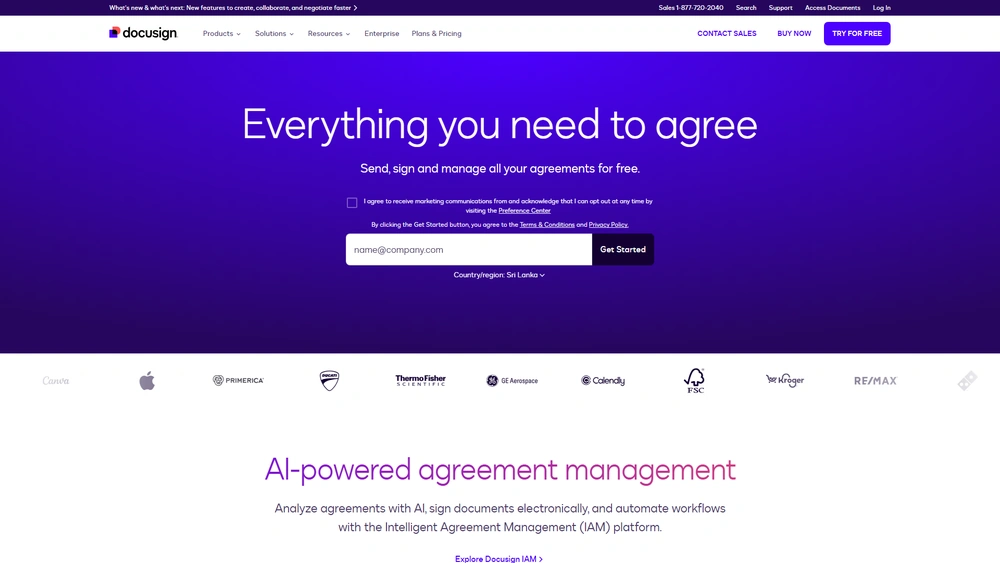Docusign Overview & 2026 Industry Position
As digital operations expand across industries, Docusign remains a central force in eSignature solutions and agreement management. Built to replace paper-based processes, it empowers businesses to manage contracts securely, efficiently, and remotely. As of 2026, Docusign is more than a standalone signature tool—it’s evolved into a robust digital agreement cloud with over a billion users and integrations into critical business platforms. With the rise of hybrid work, AI document generation, and compliance mandates, Docusign is spearheading the way enterprises handle digital agreements in regulated, global environments.
From Launch to 2026: Docusign’s Journey
Founded in 2003 in Seattle, Docusign initially addressed the inefficiencies of printing, signing, and mailing paper documents. Key milestones include:
- 2005: Launch of eSignature platform for SMBs
- 2012: API released to developers, fueling integrations
- 2018: IPO raised $629M with strong Nasdaq debut
- 2020: Surge in adoption during COVID-driven remote work
- 2022: Agreement Cloud expanded with CLM capabilities
- 2024: GenAI feature set introduced: document summarization, smart fields
Looking ahead, Docusign’s 2026 strategy focuses on workflow intelligence, embedded AI, and expanding secure integrations across financial, legal, and HR systems.

Docusign Features That Matter in 2026
Docusign continues to deliver standout features, enhanced by AI and seamless workflow design:
- eSignature: Legally binding digital signatures recognized in 180+ countries
- AI-Powered Document Analysis: Automatic tagging, form field detection, and summarization
- Contract Lifecycle Management (CLM): Automates contract workflows from creation to storage
- Templates & Bulk Send: For high-volume signature use cases
- Mobile App: Intuitive signing and tracking on the go
- Granular Audit Trails: End-to-end visibility for legal and compliance teams
Workflow & UX
Docusign’s UX prioritizes clarity, scalability, and visual feedback at every step of the agreement process. Whether you’re uploading a one-page NDA or orchestrating bulk onboarding paperwork:
- Drag-and-drop field mapping with smart cues
- Step-by-step signer instructions and optional authentication
- Automated reminders and progress tracking
- Consistent mobile experience across Android and iOS
Even advanced workflows like approvals and conditional routing are simplified with a visual Logic Builder interface—a UX win for enterprise admins and legal ops teams alike.
Docusign Pricing Analysis & Value Metrics
Docusign’s plans cater to freelancers, SMBs, and large enterprises. Current pricing as of July 2026 (U.S.):
| Plan | Monthly | Annual | Main Features |
|---|---|---|---|
| Personal | $12 | $120 | 1 user, 5 sends/month, basic eSign |
| Standard | $30 | $300 | Multiple users, reminders, templates |
| Business Pro | $60 | $600 | Bulk send, signer attachments, in-person signing |
| Enterprise | Custom | Custom | CLM, AI tools, scalable API usage |
Value Summary: For most SMB workflows, Standard and Business Pro offer strong ROI. Industries dealing with complex contracts (real estate, legal, HR tech) benefit from Pro or custom-tier AI features.
Competitive Landscape
| Provider | Email Verification | AI Features | Best For |
|---|---|---|---|
| Docusign | ✔️ | ✔️ Advanced | Mid-large enterprises |
| Adobe Acrobat Sign | ✔️ | Limited | Creative/Design |
| PandaDoc | ✔️ | ✔️ | SMBs + proposals |
| SignNow | ✔️ | Cost-sensitive startups |
Pro Tip: If you manage multiple templates across departments, Docusign’s folder-based organization and permissioning layers drastically simplify governance—and make compliance audits faster.
Integrations & Ecosystem Reach
- CRM: Salesforce, HubSpot, Microsoft Dynamics
- HR: Workday, Greenhouse, BambooHR
- Finance: QuickBooks, Xero, NetSuite
- Productivity: Google Workspace, Microsoft 365, Slack
- Cloud Storage: Dropbox, OneDrive, Box
With RESTful APIs and native integrations, Docusign embeds naturally into your daily tools. Developers appreciate SDKs in Node, Java, and .NET for full automation.
Pros & Cons
- Pros:
- Legally compliant in 180+ countries
- Intuitive UI with powerful features
- Integrates into major software ecosystems
- Advanced AI for contract insights & automation
- Cons:
- Premium tiers can be pricey for solo freelancers
- Learning curve for CLM suite without onboarding
- Basic plan lacks bulk send & advanced fields
Final Thoughts on Docusign
From small businesses seeking a trusted eSign platform to global enterprises automating full contract cycles, Docusign solutions continue to deliver reliability, integration depth, and AI-powered innovation. While not the cheapest on the market, its feature set remains unmatched in critical verticals like real estate, law, healthcare, and FinTech. For teams needing rock-solid compliance, embedded analytics, and omnichannel signing experiences, Docusign is a long-term win.
Docusign FAQ
Yes. Docusign complies with the U.S. ESIGN Act and UETA, making its electronic signatures legally binding in all 50 states.
Yes. Docusign offers native integrations with leading CRMs like Salesforce, HubSpot, and Microsoft Dynamics.
Absolutely. The Docusign mobile app (iOS/Android) lets users sign, track, and send documents on the go.
Docusign tracks partial completions and sends automated reminders. Admins can resend, void, or edit the envelope if needed.
Yes. Docusign can be configured for HIPAA compliance, and offers Business Associate Agreements (BAAs) for healthcare clients.

